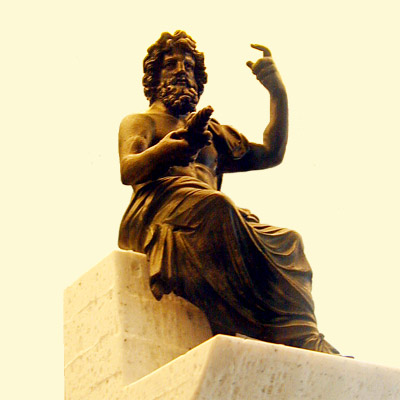Iuppiter
Home | Latíné | Deutsch | Español | Français | Italiano | Magyar | Português | Română | Русский | English
⚜⚜⚜ Site Index - Key Pages ⚜⚜⚜
Iuppiter is the God of the sky, moon, winds, rain and thunder, who became king of the Gods after overthrowing his father Saturnus. The ancient name of Iuppiter was Diespiter, whose root is Dios (= Zeus, God) + Pater (= Father). As Iuppiter Optimus Maximus, he is the tutelary God of Rome. As a warrior, he is Iuppiter Stator, protector of the City and State who exhorts soldiers to be steadfast in battle. But Iuppiter has many aspects, attributes, names and epithets...
Epithets of Iuppiter
Iuppiter was given many names.
By aspect:
Iuppiter Caelestis ("heavenly")
Iuppiter Elicius (of weather and storms)
Iuppiter Feretrius ("who carries away the spoils of war"; called upon to witness solemn oaths - cf. "by Jove"). The epithet or “numen” is probably connected with ferire, the stroke of ritual as illustrated in foedus ferire, of which the silex, a quartz rock, is evidence in his temple on the Capitoline hill, which is said to have been the first temple in Rome, erected and dedicated by Romulus to commemorate his winning of the spolia opima from Acron, king of the Caeninenses, and to serve as a repository for them. Iuppiter Feretrius was therefore equivalent to Iuppiter Lapis, the latter used for a specially solemn oath.
Iuppiter Fulgurator or Fulgens ("of the lightning")
Iuppiter Lucetius ("of the light")
Iuppiter Optimus Maximus (" the best and greatest")
Iuppiter Pluvius ("sender of rain")
Iuppiter Stator (from stare meaning "standing")
Iuppiter Summanus (sender of nocturnal thunder)
Iuppiter Terminalus or Terminus (defends boundaries)
Iuppiter Tonans ("thunderer")
Iuppiter Victor (led Roman armies to victory)
By synchronisation or geography:
Iuppiter Ammon (Jupiter was equated with the Egyptian deity Amun after the Roman conquest of Egypt)
Iuppiter Brixianus (Jupiter equated with the local god of the town of Brescia in Cisalpine Gaul (modern North Italy)
Jupiter Capitolinus, the Jupiter Optimus Maximus, venerated in all the places in the Roman Empire with a Capitol (Capitolium)
Iuppiter Dolichenus (from Doliche in Syria, originally a Baal weather and war god), since Vespasian popular among the Roman legions as god of war and victory, esp. on the Danube (Carnuntum). Stands on a bull, a thunderbolt in the left, a double ax in the right hand.
Iuppiter Indiges (Jupiter "of the country" - a title given to Aeneas after his death, according to Livy)
Iuppiter Ladicus (Jupiter equated with a Celtiberian mountain-god and worshipped as the spirit of Mount Ladicus)
Iuppiter Laterius or Latiaris ("God of Latium")
Iuppiter Parthinus or Partinus (Jupiter was worshiped under this name on the borders of north-east Dalmatia and Upper Moesia, perhaps being associated with the local tribe known as the Partheni)
Iuppiter Poeninus (Jupiter was worshiped in the Alps under this name, around the Great St Bernard Pass, where he had a sanctuary)
Iuppiter Solutorius (a local version of Jupiter worshipped in Spain; he was syncretised with the local Iberian god Eacus)
Iuppiter Taranis (Jupiter equated with the Celtic god Taranis)
Iuppiter Uxellinus (Jupiter as a god of high mountains)
